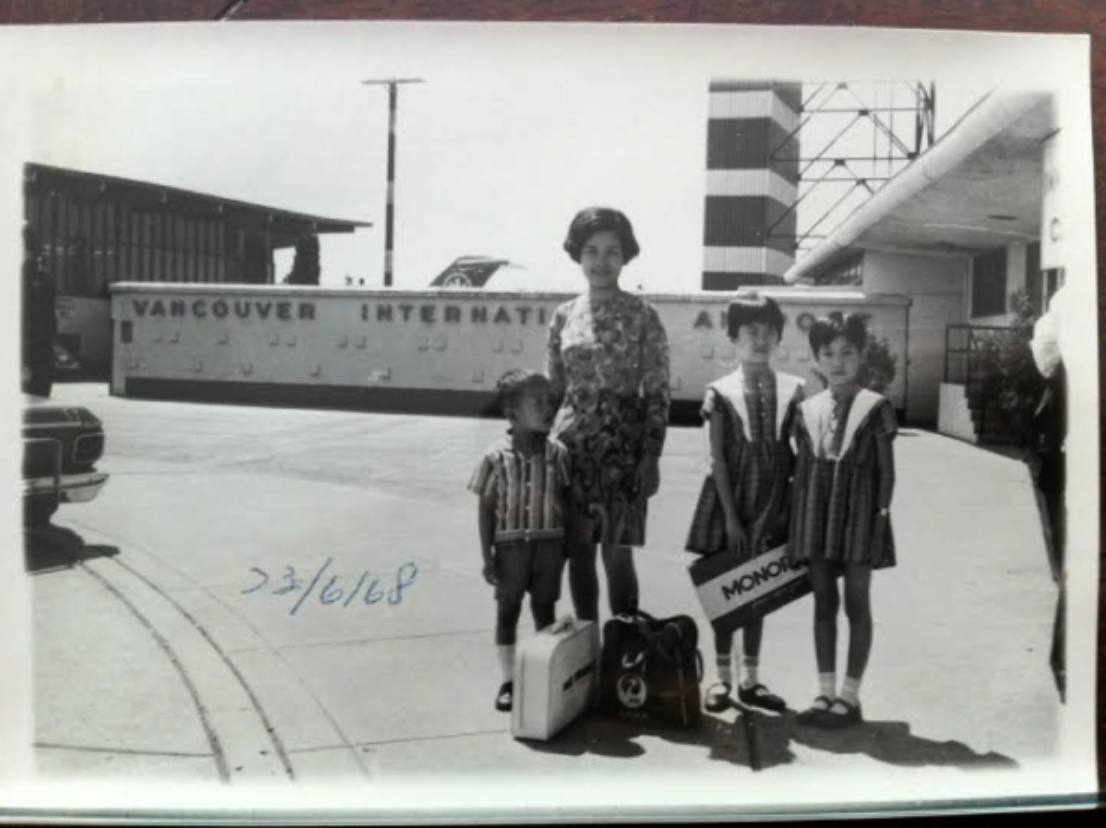Identity Stories
I was carrying a Monopoly board game. Mahmee was carrying her custom high heels in a small stack of shoe boxes tidily tied up with string. Little did my mother know that bespoke heels weren’t exactly de rigueur in Saskatoon of the ‘60s.
I suppose the game was intended to amuse the three of us little kids on a long long flight. The only problem was that the Monopoly instructions were all in English - a language none of us spoke. The game had play money with a funny £ symbol which only made sense much later.
June 23rd, 1968
That day, my sister and I wore matching dresses - my favourite chamois yellow plaid dress with a sailor collar and short, full skirt. My sister, brother and I were told that we were moving to some place called Ga Na Di. That day, we were given new names in English, aliases by our dad. I ended up with the name of a British royal – a name I couldn’t pronounce nor spell for years. That day, I felt really dumb because I instantly became illiterate: I was confused by the sudden name change, and I couldn’t even respond when questioned by someone in an official-looking uniform. Dumb and mute. I lost speech and identity, all in a single one-way flight.
It was a sunny June 23 when we arrived in Canada from Asia. I remember walking down the stairway from the plane onto the tarmac of the runway then into the airport, the whole time clutching the Monopoly box. It was barren and cold in the middle of summer. The destination was Saskatoon - barren and cold in the winter.
When we arrived in Vancouver for our connecting flights, we landed as well as ‘landed’. We were greeted at the Vancouver airport by a friend of my dad, who dropped by with his son. I was really surprised when this man handed his son a coin, and the kid was allowed to roam the airport by himself, untethered. What kind of safe place was this, where a kid could choose all by himself what to buy, unsupervised? Such freedom.
My dad later commented about the man’s hands, how they were like a cluster of bananas; the hands of a labourer, not that of the white-collar worker that he has always known. Worse yet, the suit-wearing, urban Cantonese-speaking fellow used a Toisan expression (gasp, a country dialect) for the 25-cent piece he gave his son. This should have been a signal that mahmee brought the wrong shoes.
When I migrated to Canada with my parents, we went from a two-parent family to a single-parent family and sometimes a without-parents family. You see, my father’s work was in Montréal. And because he was just starting out in Canada and unsure, he decided to leave my mum and three children with his brother’s family in Saskatoon. So not only did we have to adjust to a new country, a new language and culture, but also a new family structure. We left behind a home and joined my uncle’s household. At times my mother would travel to Montréal accompanied by my little brother, so my sister and I were without parents and instead had an uncle, aunt, a little cousin as well as a newborn cousin who arrived just days after we did.
My toddler cousin later became the first non-white Rhodes Scholar chosen in Canada, yet I’ll always think of him chasing children in a yellow fleece sleeper with white vinyl footsies – after all, that’s how we met. And my baby brother dedicated much of his past social justice activism to issues affecting newcomers through his work with the Chinese Canadian National Council in Toronto. He continues to advocate on issues of race, resettlement, and for a just redress with the Head Tax Families Society of Canada. To me, he’s the one with hair pulled back in a black elastic, through the ponytail hole of his baseball cap.
I, the black sheep of the family, am writing a story, this story.
My name is Fung Ling Feimo, and I am Canadian. To be precise, I’m a generation 1.5 Canadian who grew up in an Anglophone Jewish neighbourhood in Francophone Montréal, in then-Prime Minister Trudeau's riding (please don't fault me on that), and will always call it my hometown regardless of the decades I spent in Calgary. My grandfather was a hajji; my dad grew up in a Portuguese colony; my mum, a British colony. What does that make me?
Canadian.

